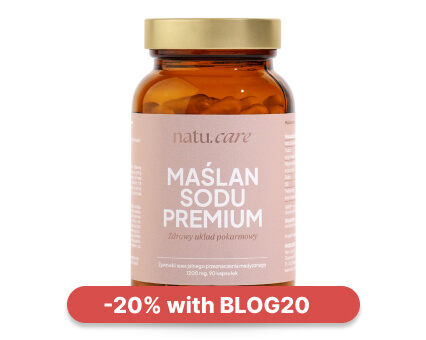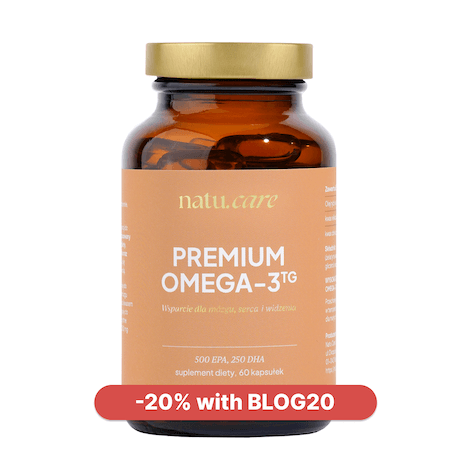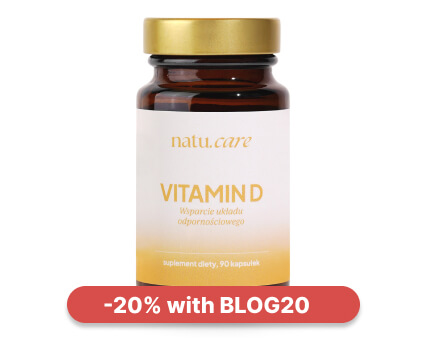Zinc - properties, occurrence, deficiency, excess
Zinc is an essential element for the health of the immune system, the skin and the wound healing process.


Learn more about our editorial process
.

Learn more about our editorial process
.

Learn more about our editorial process
.

Learn more about our editorial process
.
Why you can trust us
Articles on Natu.Care are written based on scientific research, data from government websites and other reliable sources. The texts are written in cooperation with doctors, nutritionists and other health and beauty experts. Articles are reviewed before publication and during significant updates.
.Learn more about our editorial process
.Information about advertisements
Content on Natu.Care may contain links to products from the sale of which we may receive a commission. When creating content, we adhere to high editorial standards and take care to be objective about the products discussed. The presence of affiliate links is not dictated by our partners, and we select the products we review ourselves completely independently.
.Learn more about our terms and Conditions
.Zinc is a mineral essential for the health of our body. It influences DNA formation, cell growth and also supports the immune system. From this article you will learn more about the properties and occurrence of zinc, as well as the symptoms of zinc deficiency or excess.
Do you like oysters? They are the richest source of zinc in foods. In 100 grams of these shellfish you will find as much as 91 mg of zinc. But if you don't like them, don't worry. Together with clinical nutritionist Joanna Serwinska-Jania, we have prepared the perfect recipe to supply you with zinc. Interested? Interested? Just read on!
.
Description of contents:
.- What is zinc? .
- Properties of zinc? .
- Zinc requirements .
- In which products is zinc present? .
- Zinc deficiency .
- Zinc excess .
- Zinc supplementation .
- Zinc during pregnancy .
- Zinc and alcohol .
- Zinc interactions with medications .
- Summary .
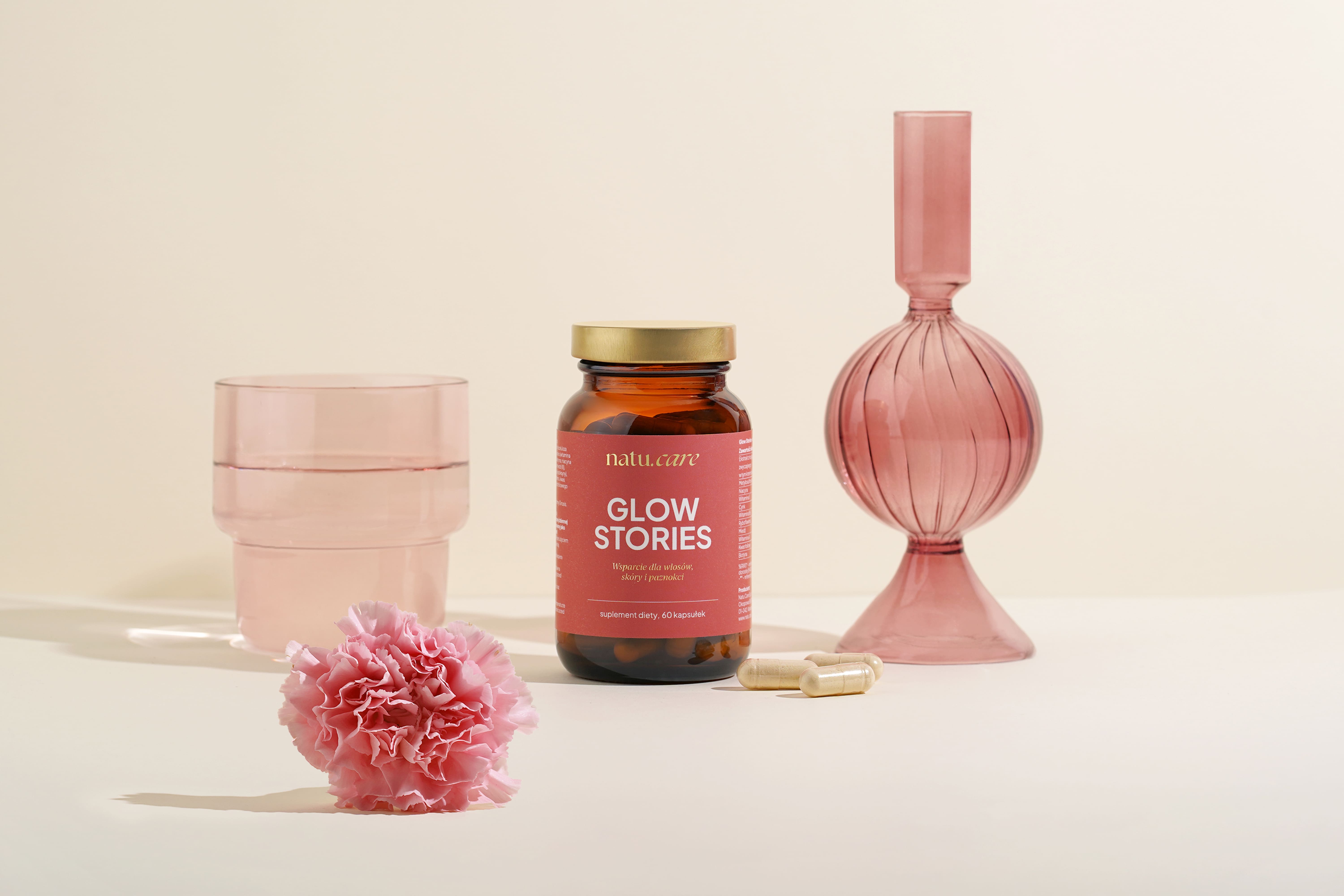
Odkryj, co dla Twojej urody może zrobić Natu.Care Glow Stories
Skóra, włosy, paznokcie: Glow Stories
Wesprzyj prawidłowy stan skóry, włosów i paznokci i ochroń komórki przed stresem oksydacyjnym!
Sprawdź cenę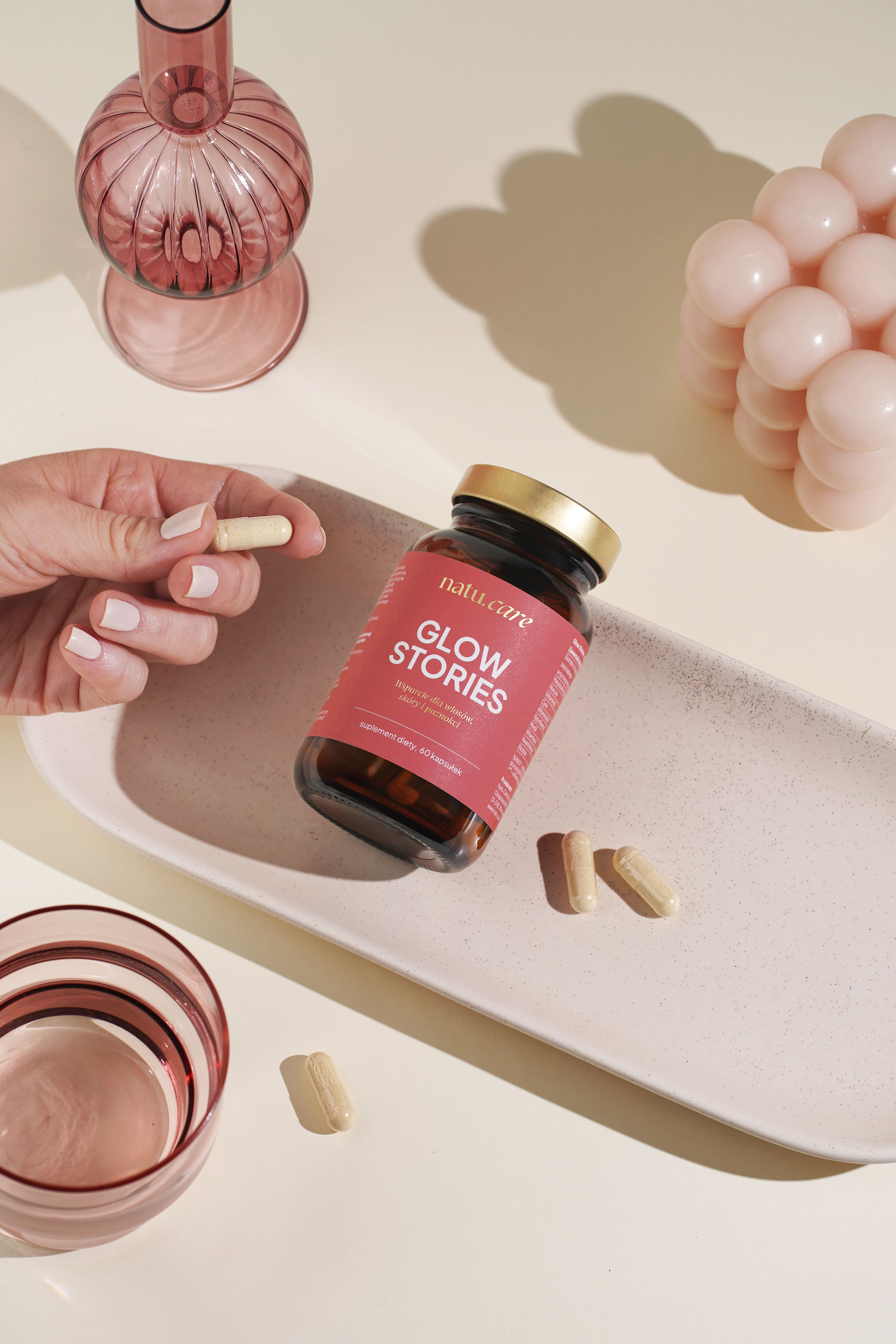
Glow Stories to formuła aktywnych składników, które zostały starannie dobrane wedle najnowszych badań naukowych. Znajdziesz w nich biotynę, cynk i miedź pielęgnujące zdrowie włosów i promiennej cery. Ponadto cynk jest odpowiedzialny także za zachowanie zdrowych paznokci. Mądra suplementacja zadba o Twoje piękno od środka.Julia Skrajda, dietetyk kliniczny
See also:
- Zinc tablets [properties and dosage + ranking] .
- Magnesium [properties + deficiency symptoms + best sources] .
- Best magnesium [ranking + expert opinion] .
- Potassium [deficiency + standard + what it's in]
- Chromium [properties + use + supplementation] .
- Iron [properties + sources + deficiency] .
- Selenium [properties + dosage + supplementation] .
- Iodine [properties + dosage + deficiency symptoms] .
- MSM or organic sulfur [what it is and properties + dosage]
- Copper [properties, deficiency, excess] .
What is zinc?
.
Zinc is an essential mineral found throughout the bodyand. It is responsible for the immune system, metabolism, as well as the sense of taste and smell. Zinc must be obtained through the diet - the body is incapable of producing and storing this element.
Role in the body
.
Zinc is a mineral necessary for the body to function properly. It is the second most abundant micronutrient in our bodyand. It is preceded only by iron, and zinc itself is present in every cell of the body. It is responsible for the function of over 300 enzymes that support digestion, metabolism, nerve function and other processesand.
The elements in our body are divided into macronutrients and micronutrients. There are many more macronutrients than micronutrients. These include elements such as bone-building calcium. Zinc belongs to the micronutrients; its quantities in the body are much lower than, for example, the aforementioned calcium..
 .
.
Aleksandra CudnaDietitian
.
Properties of zinc
.
You already know what zinc is and its role in the body. However, it is its properties that are most important. What function does zinc have in our body?
Promotes the immune system
.
Zinc is helpful in maintaining the health of the immune systemand. The results of seven studies suggest, that supplementation with 80-92 mg of zinc per day can reduce the duration of a cold by up to 33 per cent . It doesn't stop there, zinc supplements reduce the risk of infection and also strengthen the immune system in older people.
You may be interested in: Vitamin C - what it is, properties, effects, deficiency
Reduces inflammation
.
The effects of chronic inflammation can be cardiovascular disease or cancerand. Zinc reduces oxidative stress and has an anti-inflammatory effect .
Reduces the risk of disease
.
Zinc may prevent the onset of some diseasesand, especially in older people. Studies suggest that supplementation with this element improves mental performance , and also reduces the risk of pneumonia . What's more, supplementation with 45 mg of zinc a day can reduce the risk of infection (among older people) by just under 66 per cent .
Promotes wound healing
.
Zinc plays an important function in the synthesis of collagenand. This is why it is often used in hospitals to treat burns, ulcers or other skin injuries. Zinc deficiency can slow down wound healing, and supplementation with zinc speeds up recovery. This is confirmed by one study in which patients with ulcers were healed much faster with the help of zincand.
Vitamin E also promotes wound healing. Would you like to learn more about it? Take a look at my article: Vitamin E - properties, effects, occurrence, dosage
Helps treat acne
.
Acne is a skin condition that affects 9.4%and all people. It is led to by inflammation, hormonal changes, or sebaceous gland dysfunction. Research suggests, that supplementation with zinc may reduce inflammation and therefore, treat acne .
You may be interested in: Facial collagen - ranking, effects, use [TOP 10]
.
How else does zinc work?
.
- .
-
Helps treat diarrhoea in infantsand.
Natu.Care Collagen Premium 5000 mg, mango & passion fruit

- Collagen content: 5000 mg marine collagen hydrolysate
- Additional active ingredients: vitamin C, low molecular weight hyaluronic acid (and L-theanine and coenzyme Q10 in cocoa flavoured collagen or vitamin A and vitamin E in mango–passion fruit flavoured collagen)
- Form: powder sachets
- Dose: 1 sachet per day
- Sufficient for: 30 days
Product description
Fish collagen from the Natu.Care brand in a dose of 5000 mg, based on certified ingredients of the best quality. Regular supplementation will positively influence the appearance of the skinóry, hairów and nails – they will be rebuilt and strengthened from the inside.
In addition to collagen, which is valuable for health and beauty, it also offers other active ingredients that help to maintain a youthful complexion, shiny hair and strong nails.
The formula contains a sufficient portion of the active ingredient to positively affect joints, the musculoskeletal system and immunity.
Natu.Care Premium Collagen is available in two flavours – Cacao Bloom and Rise&Shine. Both formulas are based on the following active ingredients: marine collagen hydrolysate, wild roseóbud extract and hyaluronic acid.
Additionally, Cacao Bloom contains natural L-theanine, coenzyme Q10 and defatted Dutch cacao. Rise&Shine instead contains vitamin E and vitamin A.
These are the best collagens in the world.
These best fish collagens on the market also rós taste – Cacao Bloom is a treat for chocolate lovers. Rise&Shine will appeal to those whoólike the refreshing taste of mangoófruit and passion fruit.
Pros and cons
Pros:
- Vitamin C supports the body's collagen production, enhancing its effectiveness.
- An effective dose of hyaluronic acid, which additionally supports skin hydration and joint health.
- Fish collagen absorbs 50% better. Additionally, the manufacturer specifies the fish species it is sourced from (Atlantic cod).
- The composition has been tested by the independent and accredited J.S. Hamilton laboratory.
- MSC (Marine Stewardship Council) quality certification, which confirms that the collagen source supports sustainable fishing practices.
Cons:
- None.
Additional information
Natu.Care's fish collagen receives praise for its delicious taste. You won't find the fishy aftertaste that often comes through in other collagens. Plus, you have two tasty flavors to choose from: cocoa and mango-passionfruit.
Active ingredients like coenzyme Q10, hyaluronic acid, and natural L-theanine provide anti-inflammatory and antioxidant benefits while slowing down aging processes.
User review
Super, after about 6 weeks of use, the skin on my face became noticeably firmer. Wonderful taste.
Ania ZalewskaNatu.Care customer
Natu.Care Premium collagen 10 000 mg, mango-maracuja
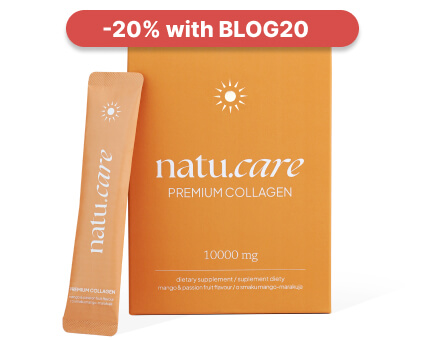
- Collagen content: 10,000 mg marine collagen hydrolysate
- Additional active ingredients: vitamin C, low molecular weight hyaluronic acid (and L-theanine and coenzyme Q10 in cocoa flavoured collagen or vitamin A and vitamin E in mango–passion fruit flavoured collagen)
- Form: powder sachets
- Dose: 1 sachet per day
- Sufficient for: 30 days
Product description
One of the strongest collagens on the market, whichós provides as much as 10,000 mg in a daily serving. This allows the formula to effectively support the condition of the skin, hair and nails.
With this supplement, you will support your beauty, which will allow you to visually stop the ageing process and feel a second youth!
Natu.Care Collagen Premium 10 000 mg comes in two flavours – cherry and mango-maracuja. Both formulas have the same product backbone – collagen, hyaluronic acid and vitamin C.
In the cherry version you additionally find glucosamine, chondroitin and Indian frankincense resin extract. Mango-maracuja, on the other hand, contains vitamin E and vitamin A.
Pros and cons
Pros:
- Tested collagen formula – SeaGarden, whose effects have been confirmed in clinical studies.
- Effective dose of hyaluronic acid, additionally moisturizing the skin and positively impacting joint health.
- Vitamin C supports the body’s natural collagen production.
- The composition has been tested by the independent and accredited J.S. Hamilton laboratory.
- The product has an MSC (Marine Stewardship Council) quality certification – the collagen source supports sustainable fishing practices.
Cons:
- None.
Additional information
Users praise Natu.Care Collagen Premium for the easy dissolvability of the powder.
User review
I noticed a significant improvement in my skin texture after a few weeks of taking collagen regularly. My complexion is now as soft as velvet!
Natu.Care Collagen Premium 10000 mg, cherry

- Collagen content: 10,000 mg of hydrolyzed bovine collagen
- Additional active ingredients: vitamin C, low molecular weight hyaluronic acid, glucosamine, chondroitin, extract of Indian frankincense resin (boswellia serrata)
- Form: powder sachets for drinking
- Serving: 1 sachet per day
- Lasts for: 30 days
Product description
One of the strongest collagens on the market, providing as much as 10,000 mg per daily serving. This product can effectively support the condition of joints, skin, hair, and nails.
With this supplement, you will support your skeletal and joint system as well as your beauty, helping you visually halt the aging process and feel rejuvenated!
Pros and cons
Pros:
- The daily portion of collagen is very large – as much as 10,000 mg.
- Proven collagen formula – COLLinstant, whose effectiveness has been confirmed in clinical studies.
- Effective dose of hyaluronic acid, which additionally moisturizes the skin and positively affects joint health.
- Vitamin C supports the body's natural collagen production.
- Glucosamine is a fundamental building block of compounds found in joint cartilage and a component of collagen that gives elasticity to connective tissue in tendons.
- Chondroitin is a natural component found in the human body, mainly in cartilage. This large molecule (mucopolysaccharide) has the ability to absorb water, which helps maintain the elasticity and resilience of cartilage.
- Frankincense resin extract supports blood circulation and joint mobility and reduces their stiffness. It may help alleviate inflammatory conditions.
- The composition has been tested by the independent and accredited J.S. Hamilton laboratory.
Cons:
- None.
Additional information
Users praise Natu.Care Collagen Premium for the easy dissolving of the powder.
Premium Sodium Butyrate
Product description
Premium Sodium Butyrate is a natural support for your digestive system. With a high dose of butyric acid (940 mg), it supports the regeneration of the intestinal mucosa, improving gut health and function, and aids in the absorption of nutrients. By taking care of your intestines, you're taking care of the health of your entire body.
Studies involving people suffering from irritable bowel syndrome confirm that sodium butyrate is ideal for supporting issues related to bacterial flora imbalances (for example, after antibiotic therapy), constipation and diarrhea, inflammation of the intestinal mucosa, or a diet low in fiber.
Premium Sodium Butyrate capsules are made using the innovative DRcaps® technology. This guarantees that the active ingredients in the product are protected from the destructive effects of stomach acids and digestive enzymes. As a result, we can be sure that the beneficial ingredients are released in the small intestine and are fully absorbed by our body.
Premium Sodium Butyrate from Natu Care is 100% tested, and its composition contains only the highest quality raw materials.
Pros and cons
Pros:
- Supports digestive system function
- Helpful for various gastrointestinal conditions, including IBS
- High dose of butyric acid in each capsule
- Eco-friendly, clean, and tested composition
- Free from added sugar, gluten, GMOs, and lactose
- Innovative capsule technology - DRcaps
Cons:
- None
Additional Information
Take 3 capsules daily at any time of the day, preferably with a meal. Swallow the capsules whole with water.
Premium Sodium Butyrate is intended for adults.
The product should be used under medical supervision.
User review
I've been using the product for 2 weeks. My stomach feels lighter, and my digestion has improved. I recommend it.
Natu.Care Premium Magnesium + Vitamin B6
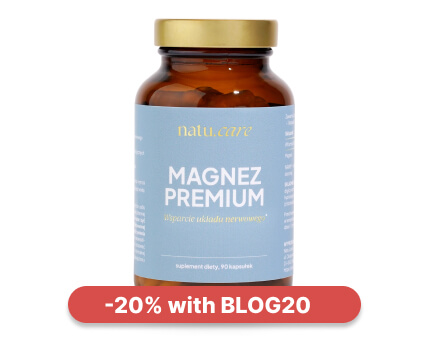
- Magnesium content per day: 305 mg
- Additional active ingredients: Vitamin B6 (2.1 mg)
- Form: capsules
- Serving size: 3 capsules per day
- Sufficient for: 30 days
Product description
The Premium Magnesium + Vitamin B6 dietary supplement is a comprehensive product that combines three organic forms of magnesium (citrate, malate, and diglycinate) and vitamin B6 in highly absorbable forms.
Magnesium is an essential mineral without which our bodies cannot function properly. It supports the immune, nervous, and muscular systems, maintains electrolyte balance, and is involved in cell division and the regulation of mental functions.
Research shows that magnesium supplementation is even more effective when accompanied by vitamin B6, which is included in our product. Vitamin B6 is responsible for the proper functioning of the nervous and immune systems, as well as the proper functioning of the heart.
If you want to safely get rid of feelings of fatigue, concentration problems, hair loss, muscle cramps, trembling, or irritability, reach for Premium Magnesium from Natu.Care, tested by the independent, certified laboratory J.S. Hamilton Poland.
Pros and cons
Pros
- Supports the proper functioning of the nervous and immune systems.
- Reduces feelings of fatigue and tiredness.
- Maintains proper psychological functions.
- The purity of the ingredients (free from anti-caking agents, artificial fillers, and additives such as titanium dioxide, microcrystalline cellulose, talc, magnesium stearate, and silicon dioxide) has been confirmed by laboratory tests.
- High absorption of ingredients.
- Soft capsules that are easy to swallow.
- Suitable for vegetarians and vegans.
Cons
- None.
Additional information
Take with a meal, 3 capsules per day.
The capsules should be taken with at least 250 ml of water.
If you have trouble sleeping, it is advisable to take 1 capsule in the morning and 2 capsules in the evening, no later than 4 hours before bedtime.
Avoid combining with products high in calcium (milk, yogurt, cheese), as this may negatively affect magnesium absorption.
Pregnant and breastfeeding women should consult a doctor before starting supplementation.
User review
I’m very impressed with the speed of delivery. The product itself is of high quality and absorbs well. After two weeks of supplementation, I’ve noticed a significant improvement in muscle recovery, especially during periods of intense training. I highly recommend it!
Product description
The dietary supplement contains omega-3ᵀᴳ, or omega-3 acids in the form of trójglyceridesów. Scientific studies suggest that this form of fatty acidsós up to 2 times better absorbed than the estersós present in many dietary supplements on the market. This means that you are assured of their effectiveness and of supplying yourself with valuable omega acids.
Fatty acids omega-3 are derived from wild anchovy oil. It is a rich source of healthy fats that are essential for the health of the cardiovascular, immune and nervous systems, as well as the proper function of vision, joints muscles.
Scientific research suggests that wild anchovies are a good source of healthy fats.
Scientific research also suggests that an adequate intake of omega-3 fatty acidsós protects against and supports the treatment of depression and anxiety disorders. In addition, omega-3s influence the hydration and appearance of the skinóry and support healthy sleep.
.
The formula contains a total of 750 mg of EPA+DHA acidsós, which is three times higher than the recommended minimum of 250 mg for the Polish population. Omega-3 TG Premium has studies indicating that its TOTOX is 9, which is a very good result.
Supplementation of omega-3 fatty acidsóis recommended for anyone who does not eat 1–2 portions (approximately 300 g) of oily fish per week. Children during growth, seniors, physically active people, vegans and vegetarians, as well as patients undergoing cardiovascular treatment and prevention of heart disease also have an increased need.
Pros and cons
The dietary supplement contains omega-3ᵀᴳ, or omega-3 acids in the form of trójglyceridesów. Scientific studies suggest that this form of fatty acidsós up to 2 times better absorbed than the estersós present in many dietary supplements on the market. This means that you are assured of their effectiveness and of supplying yourself with valuable omega acids.
Fatty acids omega-3 are derived from wild anchovy oil. It is a rich source of healthy fats that are essential for the health of the cardiovascular, immune and nervous systems, as well as the proper function of vision, joints muscles.
Scientific research suggests that wild anchovies are a good source of healthy fats.
Scientific research also suggests that an adequate intake of omega-3 fatty acidsós protects against and supports the treatment of depression and anxiety disorders. In addition, omega-3s influence the hydration and appearance of the skinóry and support healthy sleep.
.
The formula contains a total of 750 mg of EPA+DHA acidsós, which is three times higher than the recommended minimum of 250 mg for the Polish population. Omega-3 TG Premium has studies indicating that its TOTOX is 9, which is a very good result.
Supplementation of omega-3 fatty acidsóis recommended for anyone who does not eat 1–2 portions (approximately 300 g) of oily fish per week. Children during growth, seniors, physically active people, vegans and vegetarians, as well as patients undergoing cardiovascular treatment and prevention of heart disease also have an increased need.
Additional information
The dietary supplement contains omega-3ᵀᴳ, or omega-3 acids in the form of trójglyceridesów. Scientific studies suggest that this form of fatty acidsós up to 2 times better absorbed than the estersós present in many dietary supplements on the market. This means that you are assured of their effectiveness and of supplying yourself with valuable omega acids.
Fatty acids omega-3 are derived from wild anchovy oil. It is a rich source of healthy fats that are essential for the health of the cardiovascular, immune and nervous systems, as well as the proper function of vision, joints muscles.
Scientific research suggests that wild anchovies are a good source of healthy fats.
Scientific research also suggests that an adequate intake of omega-3 fatty acidsós protects against and supports the treatment of depression and anxiety disorders. In addition, omega-3s influence the hydration and appearance of the skinóry and support healthy sleep.
.
The formula contains a total of 750 mg of EPA+DHA acidsós, which is three times higher than the recommended minimum of 250 mg for the Polish population. Omega-3 TG Premium has studies indicating that its TOTOX is 9, which is a very good result.
Supplementation of omega-3 fatty acidsóis recommended for anyone who does not eat 1–2 portions (approximately 300 g) of oily fish per week. Children during growth, seniors, physically active people, vegans and vegetarians, as well as patients undergoing cardiovascular treatment and prevention of heart disease also have an increased need.
Expert opinion
The dietary supplement contains omega-3ᵀᴳ, or omega-3 acids in the form of trójglyceridesów. Scientific studies suggest that this form of fatty acidsós up to 2 times better absorbed than the estersós present in many dietary supplements on the market. This means that you are assured of their effectiveness and of supplying yourself with valuable omega acids.
Fatty acids omega-3 are derived from wild anchovy oil. It is a rich source of healthy fats that are essential for the health of the cardiovascular, immune and nervous systems, as well as the proper function of vision, joints muscles.
Scientific research suggests that wild anchovies are a good source of healthy fats.
Scientific research also suggests that an adequate intake of omega-3 fatty acidsós protects against and supports the treatment of depression and anxiety disorders. In addition, omega-3s influence the hydration and appearance of the skinóry and support healthy sleep.
.
The formula contains a total of 750 mg of EPA+DHA acidsós, which is three times higher than the recommended minimum of 250 mg for the Polish population. Omega-3 TG Premium has studies indicating that its TOTOX is 9, which is a very good result.
Supplementation of omega-3 fatty acidsóis recommended for anyone who does not eat 1–2 portions (approximately 300 g) of oily fish per week. Children during growth, seniors, physically active people, vegans and vegetarians, as well as patients undergoing cardiovascular treatment and prevention of heart disease also have an increased need.
Natu.Care Vitamin D 2000 UI
Product description
Vitamin D plays a crucial role in our health and well-being. It affects calcium and phosphate metabolism, which translates to healthy bones and teeth. It also helps regulate the immune system, and studies indicate its influence on the functioning of the nervous system.
Vitamin D, although called a “vitamin,” is actually a prohormone that our body produces on its own, primarily under the influence of sunlight. Unfortunately, our modern lifestyle contributes to deficiencies of this essential vitamin. Working in enclosed office buildings, using (necessary!) SPF creams, and covering the body with clothing all make it very difficult, if not impossible, to obtain adequate levels of vitamin D from sunlight. This is why appropriate, year-round supplementation is so crucial.
Vitamin D from Natu.Care is a well-tested vitamin D3 suspended in safflower oil, a plant known for its numerous health benefits. The convenient, easy-to-swallow capsule will make supplementation a part of your daily, healthy routine, improving your overall well-being.
Pros and cons
Pros:
- Ensures proper functioning of the immune system
- Supports the maintenance of healthy bones and teeth
- Maintains proper heart, kidney, and muscle function
- Tested by an independent, certified laboratory
- Convenient and easy-to-swallow capsule
- Clean composition - free from added sugar, gluten, GMOs, lactose, and without preservatives or colorants
Cons:
- None.
Additional Information
Pregnant women and breastfeeding mothers should consult a doctor before using the product. This dietary supplement is intended for a healthy adult population up to the age of 75.
Collagen Booster - Glow Stories
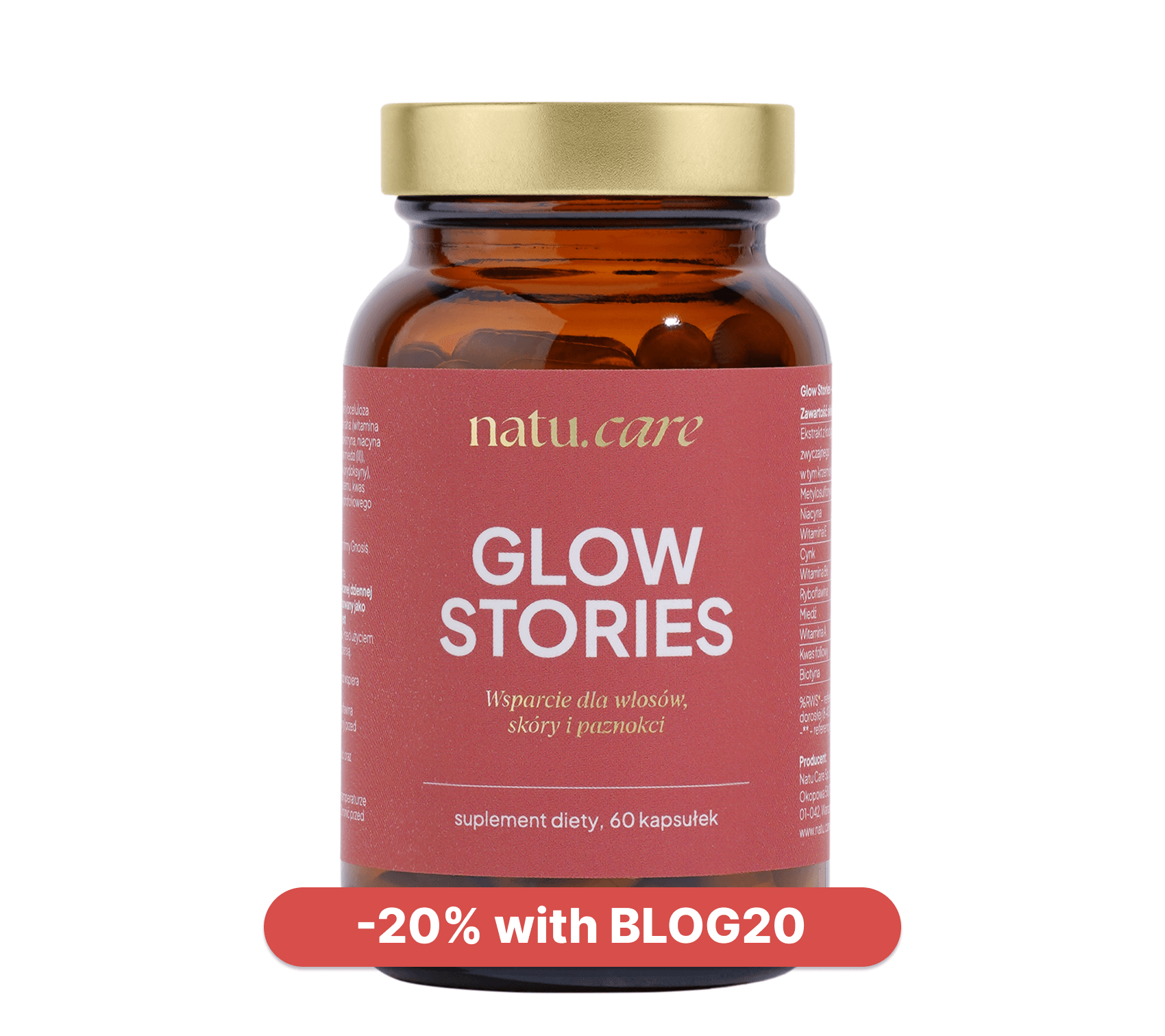
- Active ingredients: bamboo shoot extract, Quatrefolic®, L-Methionine, L-cysteine, vitamin E, vitamin A, niacin (vitamin B3), vitamin B6, vitamin B2 (riboflavin), biotin, zinc, copper
- .
- Form: capsules
- .
- Dose: 1 capsule per day
- .
- Sufficient for: 60 days
- .
Product description
A dietary supplement containing vitamins, minerals and plant extracts thatósupport the skinóhand, hair and nails. The product is especially distinguished by the form of folate – it is Quatrefolic, whichós absorbed very well and is natural.
In addition to valuable vitamins and minerals, such as vitamin A, E, B3, B2 and biotin, the formula contains bamboo shoot extract, whichóry further enhances your beauty.
Pros and cons
A dietary supplement containing vitamins, minerals and plant extracts thatósupport the skinóhand, hair and nails. The product is especially distinguished by the form of folate – it is Quatrefolic, whichós absorbed very well and is natural.
In addition to valuable vitamins and minerals, such as vitamin A, E, B3, B2 and biotin, the formula contains bamboo shoot extract, whichóry further enhances your beauty.
Additional information
A dietary supplement containing vitamins, minerals and plant extracts thatósupport the skinóhand, hair and nails. The product is especially distinguished by the form of folate – it is Quatrefolic, whichós absorbed very well and is natural.
In addition to valuable vitamins and minerals, such as vitamin A, E, B3, B2 and biotin, the formula contains bamboo shoot extract, whichóry further enhances your beauty.
Zinc requirements
.
Daily zinc requirements depend on your age. How much zinc do you need to provide for yourself and your children?
Children
. .
|
Age |
Daily zinc requirements*and |
|
0-6 months |
2 mg |
|
7-11 months |
3 mg |
|
1-3 years |
3 mg |
|
4-9 years |
5 mg |
|
10-12 years |
8 mg |
|
13-18 years old girls |
9 mg |
|
13-18 years old boys |
11 mg |
*nutrition standards for the Polish population
Adults
.
For adult men the zinc requirement is 11 mg, when women only need 8 mgand. The requirement increases during pregnancy and during breastfeeding. Expectant women should take 12 or 11 mg of zinc, consecutively until and after the age of 19. Conversely, during breastfeeding, the requirement increases to 13 and 12 mg respectively.
Maximum dose
.
Everyone should adhere to the recommended daily dose of zinc. Nevertheless, it is also worth mentioning the upper limit. What are the healthy limits of zinc supplementation?"
.
|
Age . |
Maximum daily intake of zinc*and |
|
0-12 months |
No data available |
|
1-3 years |
7 mg |
|
4-6 years |
10 mg |
|
7-10 years |
13 mg |
|
11-14 years |
18 mg |
|
15-17 years |
22 mg |
|
>17 years |
25 mg |
*nutrition standards for the Polish population
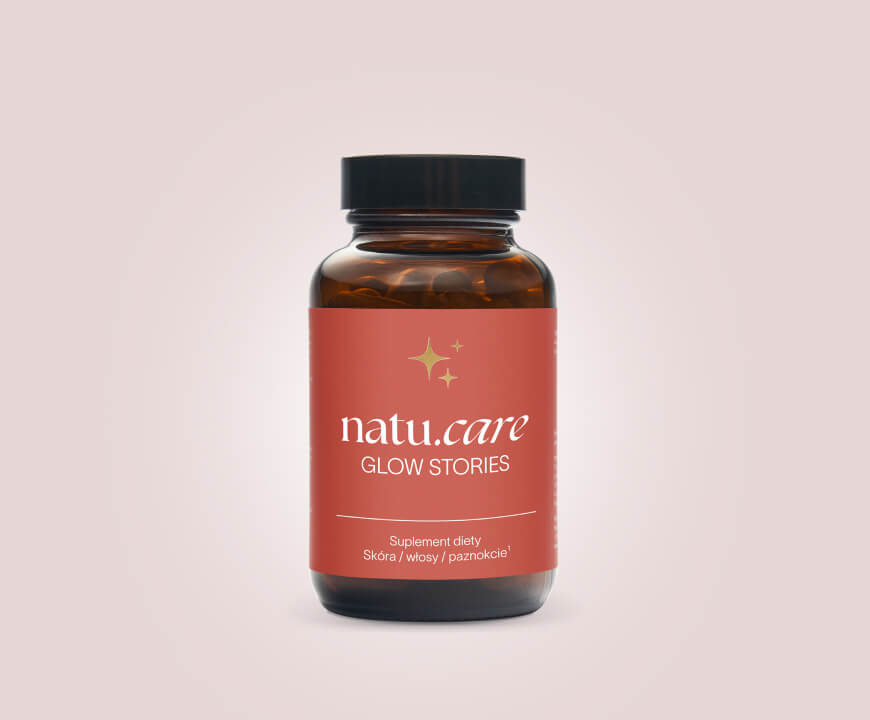
Glow Stories - for skin, hair and nail health
.Product with high-quality folic acid Quatrefolic®, bamboo shoot extract and ingredients that have a positive effect on skin, hair and nails.
In which products is zinc found?
.
Not keen on the aforementioned oysters? Not lost! Here are 10 products where you'll find the most zinc.
.
The main sources of zinc in the diet of Poles are cereal products (30-40%) and meat, processed meats and fish (28-34%). Large amounts of zinc are also found in nuts, seeds, baker's yeast, rennet cheeses and pulses. Zinc is absorbed from the diet in 20-40%, but this value increases in case of deficiency..
 .
.
Aleksandra CudnaDietitian
.
Tasty salad, or a solid dose of zinc from a nutritionist!
.
With clinical nutritionist Joanna Serwinska-Jania we have a tasty and healthy suggestion for you. Salmon, egg and pumpkin seed salad will provide you with plenty of zinc. The preparation time for this dish is just 15 minutes.
.
What ingredients will you need to stock up on?
.
- .
-
Spinach: 50 g (two handfuls)
. -
Egg: 50 g (one piece)
-
Smoked salmon: 50 g
-
Fresh cucumber: 45 g
-
Red peppers: 57.5 g
-
Olives: 45 g (one handful)
-
Pumpkin seeds: 20 g (two tablespoons)
-
Sunflower seeds: 10 g (one tbsp)
-
Black pepper: 0.3 g (one pinch)
-
Salt: 0.3 g (one pinch)
-
Olive oil: 10 g (one tablespoon)
-
Honey: 4 g (half a teaspoon)
After shopping, it will be time for preparation. Not a master in the kitchen? Don't worry, your salad will be ready in seven easy steps!
.
-
Rinse and chop the spinach.
- .
-
Hard-boil the egg (about 8-10 minutes).
- Cook the spinach.
-
Tear the salmon into smaller pieces.
- Tear the salmon into smaller pieces.
-
Dice the cucumber and peppers.
- Dice the salmon.
-
Fine-mix all the ingredients together.
- There is no need to use any of the ingredients.
-
Prepare the sauce: mix the olive oil with the honey, salt and pepper.
Prepare the sauce: mix the olive oil with the honey, salt and pepper.
- Prepare the sauce.
-
Pour the dressing over the salad and sprinkle with the chopped nuts.
-
Pour the dressing over the salad and sprinkle with the chopped nuts.
Are you curious about what a salad by nutritionist Joanna Serwinska-Jani will provide you with? Here is a table where you can find the most important information:
.
.
|
Kcal |
510.49 |
|
Protein |
27.84 g |
|
Fat |
39.17 g |
|
Carbohydrates . |
17.06 g |
|
Zinc |
3.52 mg |
| . |
6.33 mg . |
Zinc deficiency
.
You are not following a balanced diet? Zinc deficiency occurs worldwide, and it is inadequate diet that is the main reasonand. Despite the fact that a lack of this element is the most common complaint of people in developing countries, it is worth knowing the symptoms of zinc deficiency in the body. What are the symptoms of zinc deficiency?
Symptoms
.
Zinc is a valuable trace element without which our body is unable to function. That is why its deficiency will quickly translate into the following symptoms.
Symptoms of zinc deficiency in the body:
-
weakening of the immune systemand,
Have you noticed these symptoms in yourself? If so, see your doctor as soon as possible. Otherwise you will put yourself at risk of serious consequences of zinc deficiency.
Restricted zinc absorption is affected by the presence of phytates, fibre, oxalates and certain minerals (e.g. copper, calcium) in the body. This process can also be impaired by excessive alcohol consumption..
Agata GrzelaczykDietitian
How to tell if you have a zinc deficiency? You can check the concentration of zinc in your body by doing blood tests.
Effects
.
In the long term, untreated zinc deficiency is very dangerous. What does it lead to?
Effects of zinc deficiency in the body:
.
-
Stunting of growthand,
. - .
- .
- .
Zinc excess: symptoms
.
The upper level of daily zinc intake is 40 mg for an adult. In most people, this dose will not cause side effects. Despite the fact that oysters contain significantly more zinc, there have been no reported cases of zinc poisoning from food sources to date. Zinc overdose can, however, occur when we use unreasonable supplementation.
Symptoms of excess zinc in the body:
-
nausea and vomitingand,
. - .
Note!
.Any person who experiences any of the symptoms mentioned above should see a doctor. Do not treat yourself on your own. Don't wait until "tomorrow". Don't listen to people who tell you that "it will go away soon". It's your health - take care of it.
Cync - supplementation
.
A balanced diet is the key to health. However, sometimes it is necessary to support oneself with supplements. Zinc comes in the form of capsules, tablets or liquids. The form of administration depends on one's preference.
.
Who should take it?
.
Zinc supplementation is only recommended for people who are at risk of zinc deficiency. This most commonly includes the elderly, vegetarians, and pregnant and breastfeeding women. Taking zinc can also be beneficial for people who have problems with their immune system.
Please note!
Healthy and safe supplementation should only be recommended by a specialist.

Glow Stories - for skin, hair and nail health
.Product with high-quality folic acid Quatrefolic®, bamboo shoot extract and ingredients that have a positive effect on skin, hair and nails.
Side effects
.
Supplements containing zinc are most often well toleratedand. Nevertheless, side effects such as nausea, diarrhoea or vomiting may occur in some cases. In most cases, these are the result of exceeding the safe dose of zinc. Follow the manufacturer's recommendations and supplementation will bring the expected results.
Prolonged supplementation with zinc in large quantities leads to a weakened immune system, reduced blood levels of HDL cholesterol, and impaired absorption and metabolism of copper and iron..
Agata GrzelaczykDietitian
.
Zinc in pregnancy
.
Zinc is important for the health of pregnancyand. Its adequate levels reduce premature birthsand. The baby needs zinc for cell growth, DNA production and brain development. Pregnant women have a higher daily requirement of zinc - 12 mg until the age of 19 and 11 mg after the age of 19.
Zinc and breastfeeding
.
Zinc is one of the components of human milkand. It is with the milk that infants receive this valuable element for the first months of life. Mothers who are breastfeeding should ensure that their bodies have an adequate concentration of zinc. The requirement during this period is 13 mg for women up to 19 years of age and 12 mg for women who are 19 years of age or older.
Zinc and alcohol
.
People who abuse alcohol may suffer from zinc deficiencyand. Research suggests that consumption of alcoholic beverages leads to reduced zinc levels in the gut, lungs, liver and brain. Long-term zinc deficiency in these organs can lead to dangerous inflammation, which is the cause of numerous diseases.
Interactions of zinc with drugs
.
Zinc can react with certain medications. Certain groups of people should be particularly vigilant.
Zinc interacts with:
.
- .
-
quinolone and tetracycline antibioticsand,
. - .
Are you taking these or other medications? Do not, under any circumstances, start zinc supplementation on your own!
.
See also:
- Drinking collagen [properties + ranking] .
- Drinking collagen [effects + side effects]
- Marine collagen [properties + ranking]
- Collagen for skin [ranking] .
- Collagen for joints [action + forms] .
- Collagen for hair [properties + effects]
- Collagen for wrinkles [ranking] .
- Fish collagen [effects + actions] .
- Most powerful collagen [ranking + types]
- Collagen deficiency [causes + symptoms] .
Summary
.
Remember:
.- Zinc is the second most abundant micronutrient in our body.
- It is the most abundant micronutrient in our body.
- Promoting the immune system, healing wounds faster and supporting the treatment of acne are some of the properties of zinc.
- The following are some of the properties of zinc.
- Most zinc can be found in oysters, pumpkin seeds or crab meat. .
- Women's requirement for zinc is 8 mg per day and men's is 11 mg. .
- Taking more than 25 mg of zinc on a single day can cause side effects.
- It is important to be aware of the effects of zinc deficiency.
- Zinc deficiency manifests itself as weight loss, blurred vision or disturbances in smell and taste.
- Excess zinc causes stomach problems, headaches and lowers immunity. .
- Zinc supplementation should be recommended by a specialist. .
- The requirement for zinc increases during pregnancy and lactation.
- The need for zinc increases during pregnancy and lactation.
- Zinc may interact with some medications. .
FAQ
.When to take zinc - morning or evening?
.Supplements (e.g. zinc tablets) are most effective when taken one hour before or two hours after a meal. However, if you have stomach problems and zinc supplementation causes stomach upset - take the tablets with a meal.
What flushes zinc out of the body?
.The most common cause of zinc deficiency in the body is a poor diet. Other aspects that can negatively affect the concentration of this mineral are excessive consumption of alcohol or fibre. Genetic predisposition, diseases of the digestive tract or the use of certain drugs (e.g. anti-epileptic drugs) also lead to zinc deficiency.
How much zinc to take per day?
.Daily zinc requirements change with age. Adult women should take 8 mg of zinc and men 11 mg. Note, these values include both zinc taken with diet and supplements.
What products contain zinc?
.Everyone should take zinc with their diet. The richest foods in this mineral are:
.- ostridges, .
- pumpkin seeds, .
- homar, .
- crab, .
- cashew nuts, .
- beef, .
- pork, .
Which fruits are high in zinc?
.Most fruits are not the best sources of zinc. However, some of them can provide the body with this mineral. The best fruit sources of zinc:
- avocados, .
- blueberries, .
- granate, .
- raspberries, .
- cantaloupe, .
- peach, .
- kiwi, .
- blueberries, .
What are the symptoms of zinc deficiency in the body?
When something goes wrong in the body, it usually sends us specific signals. It is no different with zinc deficiency. The most common symptoms of zinc deficiency in the body are:
- weakening of the immune system, .
- loss of weight, .
- skin changes, .
- problems with vision,
- loss of appetite,
- lack of appetite.
- loss of appetite, .
Do you get fat after zinc?
.There is no direct link between zinc intake and weight gain. Nevertheless, some dietary supplements containing zinc may also have other ingredients in their composition, such as carbohydrates, fats and sugars. In excess, these can lead to weight gain.
.
Sources
.See all
.Agnew, U. M., & Slesinger, T. L. (2022). Zinc Toxicity. In StatPearls. StatPearls Publishing. http://www.ncbi.nlm.nih.gov/books/NBK554548/
.Aumeistere, L., Ciproviča, I., Zavadska, D., Bavrins, K., & Borisova, A. (2018). Zinc Content in Breast Milk and Its Association with Maternal Diet. Nutrients, 10(10), 1438. https://doi.org/10.3390/nu10101438
Bae, Y. S., Hill, N. D., Bibi, Y., Dreiher, J., & Cohen, A. D. (2010). Innovative Uses for Zinc in Dermatology. Dermatologic Clinics, 28(3), 587-597. https://doi.org/10.1016/j.det.2010.03.006
Bao, B., Prasad, A. S., Beck, F. W., Fitzgerald, J. T., Snell, D., Bao, G. W., Singh, T., & Cardozo, L. J. (2010). Zinc decreases C-reactive protein, lipid peroxidation, and inflammatory cytokines in elderly subjects: A potential implication of zinc as an atheroprotective agent123. The American Journal of Clinical Nutrition, 91(6), 1634-1641. https://doi.org/10.3945/ajcn.2009.28836
Bhattacharya, S., & Mishra, R. K. (2015). Pressure ulcers: Current understanding and newer modalities of treatment. Indian Journal of Plastic Surgery : Official Publication of the Association of Plastic Surgeons of India, 48(1), 4-16. https://doi.org/10.4103/0970-0358.155260
Cabrera, Á. J. R. (2015). Zinc, aging, and immunosenescence: An overview. Pathobiology of Aging & Age-related Diseases, 5(1), 25592. https://doi.org/10.3402/pba.v5.25592
Cervantes, J., Eber, A. E., Perper, M., Nascimento, V. M., Nouri, K., & Keri, J. E. (2018). The role of zinc in the treatment of acne: A review of the literature. Dermatologic Therapy, 31(1), e12576. https://doi.org/10.1111/dth.12576
Dhingra, U., Kisenge, R., Sudfeld, C. R., Dhingra, P., Somji, S., Dutta, A., Bakari, M., Deb, S., Devi, P., Liu, E., Chauhan, A., Kumar, J., Semwal, O. P., Aboud, S., Bahl, R., Ashorn, P., Simon, J., Duggan, C. P., Sazawal, S., & Manji, K. (2020). Lower-Dose Zinc for Childhood Diarrhea-A Randomized, Multicenter Trial. New England Journal of Medicine, 383(13), 1231-1241. https://doi.org/10.1056/NEJMoa1915905
Fallah, A., Mohammad-Hasani, A., & Colagar, A. H. (2018). Zinc is an Essential Element for Male Fertility: A Review of Zn Roles in Men's Health, Germination, Sperm Quality, and Fertilization. Journal of Reproduction & Infertility, 19(2), 69-81.
Favier, M., & Hininger-Favier, I. (2005). [Zinc and pregnancy]. Gynecologie, obstetrique & fertilite, 33(4), 253-258. https://doi.org/10.1016/j.gyobfe.2005.03.011
Haase, H., & Rink, L. (2009). The immune system and the impact of zinc during aging. Immunity & Ageing, 6(1), 9. https://doi.org/10.1186/1742-4933-6-9
Hemilä, H. (2017). Zinc lozenges and the common cold: A meta-analysis comparing zinc acetate and zinc gluconate, and the role of zinc dosage. JRSM Open, 8(5), 2054270417694291. https://doi.org/10.1177/2054270417694291
Jarosza, M., Rychlik, E., Stoś, K., & Charzewska, J. (n.d.). Nutrition standards for the Polish population and their application.
.Karcioglu, Z. A. (1982). Zinc in the eye. Survey of Ophthalmology, 27(2), 114-122. https://doi.org/10.1016/0039-6257(82)90195-3
Lansdown, A. B. G., Mirastschijski, U., Stubbs, N., Scanlon, E., & Ågren, M. S. (2007). Zinc in wound healing: Theoretical, experimental, and clinical aspects. Wound Repair and Regeneration, 15(1), 2-16. https://doi.org/10.1111/j.1524-475X.2006.00179.x
Lim, K. H. C., Riddell, L. J., Nowson, C. A., Booth, A. O., & Szymlek-Gay, E. A. (2013). Iron and Zinc Nutrition in the Economically-Developed World: A Review. Nutrients, 5(8), 3184-3211. https://doi.org/10.3390/nu5083184
Marcellini, F., Giuli, C., Papa, R., Gagliardi, C., Dedoussis, G., Monti, D., Jajte, J., Giacconi, R., Malavolta, M., & Mocchegiani, E. (2008). Zinc in Elderly People: Effects of Zinc Supplementation on Psychological Dimensions in Dependence of IL-6 -174 Polymorphism: A Zincage Study. Rejuvenation Research, 11(2), 479-483. https://doi.org/10.1089/rej.2008.0680
Maxfield, L., Shukla, S., & Crane, J. S. (2022). Zinc Deficiency. In StatPearls. StatPearls Publishing. http://www.ncbi.nlm.nih.gov/books/NBK493231/
O'Connor, J. P., Kanjilal, D., Teitelbaum, M., Lin, S. S., & Cottrell, J. A. (2020). Zinc as a Therapeutic Agent in Bone Regeneration. Materials, 13(10), Article 10. https://doi.org/10.3390/ma13102211
Ota, E., Mori, R., Middleton, P., Tobe-Gai, R., Mahomed, K., Miyazaki, C., & Bhutta, Z. A. (2015). Zinc supplementation for improving pregnancy and infant outcome. Cochrane Database of Systematic Reviews, 2. https://doi.org/10.1002/14651858.CD000230.pub5
Pahwa, R., Goyal, A., & Jialal, I. (2022). Chronic Inflammation. In StatPearls. StatPearls Publishing. http://www.ncbi.nlm.nih.gov/books/NBK493173/
.Pisano, M., & Hilas, O. (2016). Zinc and Taste Disturbances in Older Adults: A Review of the Literature. The Consultant Pharmacist, 31(5), 267-270. https://doi.org/10.4140/TCP.n.2016.267
Plum, L. M., Rink, L., & Haase, H. (2010). The Essential Toxin: Impact of Zinc on Human Health. International Journal of Environmental Research and Public Health, 7(4), Article 4. https://doi.org/10.3390/ijerph7041342
Prasad, A. S. (2013). Discovery of Human Zinc Deficiency: Its Impact on Human Health and Disease123. Advances in Nutrition, 4(2), 176-190. https://doi.org/10.3945/an.112.003210
Ranasinghe, P., Wathurapatha, W., Ishara, M., Jayawardana, R., Galappatthy, P., Katulanda, P., & Constantine, G. (2015). Effects of Zinc supplementation on serum lipids: A systematic review and meta-analysis. Nutrition & Metabolism, 12(1), 26. https://doi.org/10.1186/s12986-015-0023-4
Read "Dietary Reference Intakes for Vitamin A, Vitamin K, Arsenic, Boron, Chromium, Copper, Iodine, Iron, Manganese, Molybdenum, Nickel, Silicon, Vanadium, and Zinc" at NAP.edu. (n.d.). https://doi.org/10.17226/10026
Science, M., Johnstone, J., Roth, D. E., Guyatt, G., & Loeb, M. (2012a). Zinc for the treatment of the common cold: A systematic review and meta-analysis of randomized controlled trials. CMAJ, 184(10), E551-E561. https://doi.org/10.1503/cmaj.111990
Science, M., Johnstone, J., Roth, D. E., Guyatt, G., & Loeb, M. (2012b). Zinc for the treatment of the common cold: A systematic review and meta-analysis of randomized controlled trials. CMAJ, 184(10), E551-E561. https://doi.org/10.1503/cmaj.111990
Shankar, A. H., & Prasad, A. S. (1998). Zinc and immune function: The biological basis of altered resistance to infection123. The American Journal of Clinical Nutrition, 68(2), S447-S463. https://doi.org/10.1093/ajcn/68.2.447S
Skalny, A. V., Skalnaya, M. G., Grabeklis, A. R., Skalnaya, A. A., & Tinkov, A. A. (2018). Zinc deficiency as a mediator of toxic effects of alcohol abuse. European Journal of Nutrition, 57(7), 2313-2322. https://doi.org/10.1007/s00394-017-1584-y
Zastrow, M. L., & Pecoraro, V. L. (2014). Designing hydrolytic zinc metalloenzymes. Biochemistry, 53(6), 957-978. https://doi.org/10.1021/bi4016617
.
Editorials
Meet the team


Editor
Graduate of Journalism and Artes Liberales at the University of Warsaw. Since 2017, he has been working with the biggest portals in Poland and abroad as an editor. Previously worked for 3 years in one of the leading pharmaceutical companies - he knows the health and beauty industry inside out. In his free time, he most enjoys playing tennis or skiing.

Fluoride is an essential mineral for the proper functioning of the body. How does it work and is it harmful? Check!
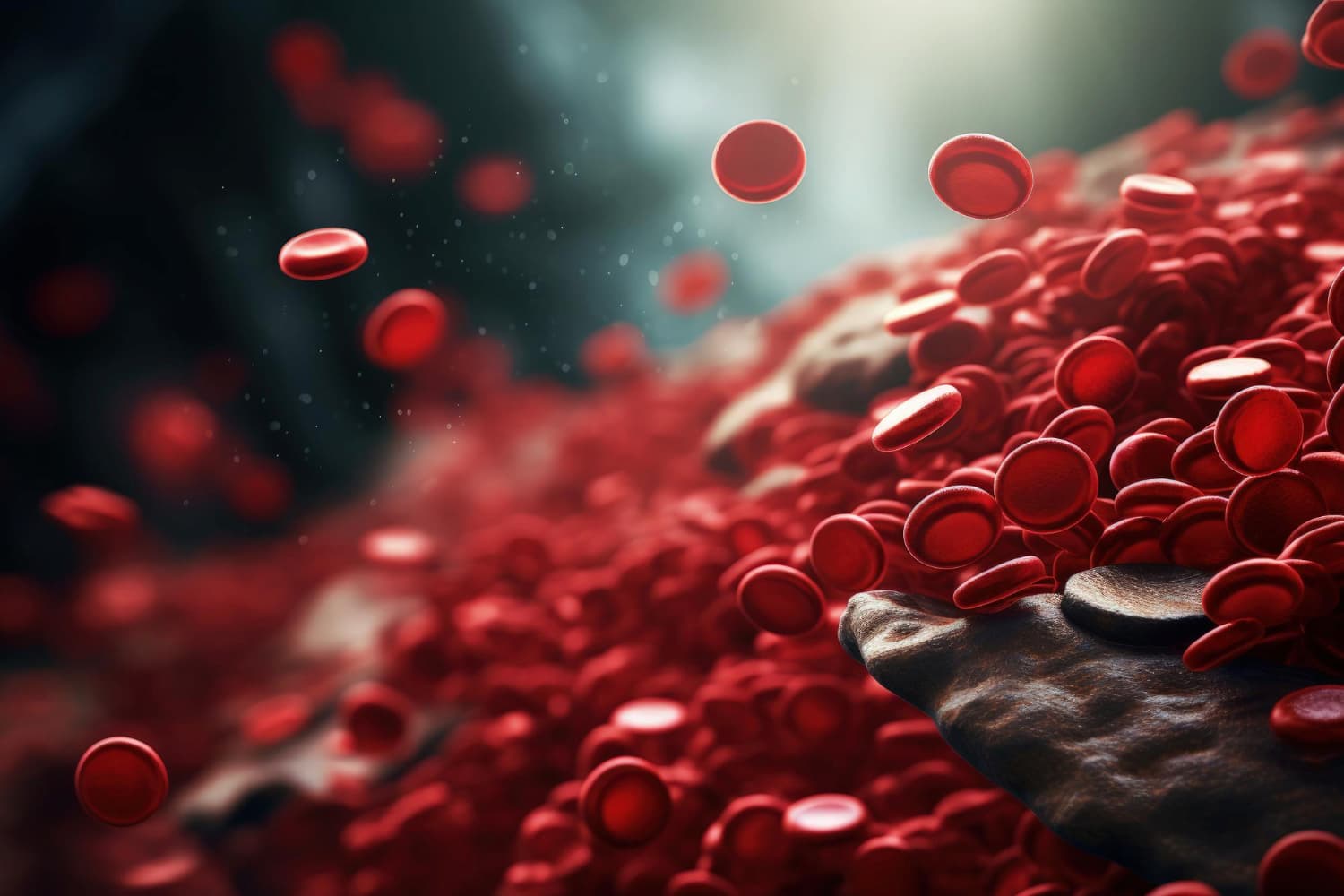
Iron deficiency is a dangerous condition leading to serious neurological and skin symptoms.

Phosphorus is a mineral element that supports bone health, nervous system function and also energy metabolism.
